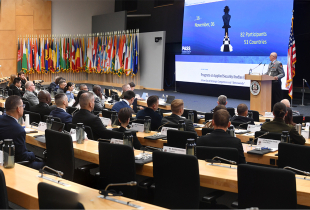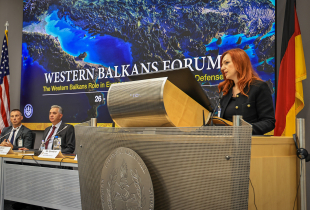
Partnership for Peace Consortium Conducts South Caucasus Regional Stability Exercise
By Partnership for Peace Consortium
KIEV, Ukraine (April 6, 2015) – The Regional Stability in the South Caucasus Working Group convened an international panel of experts from March 26 to 28 here.
The meeting was organized under the framework of the Partnership for Peace Consortium in collaboration with the Austrian Defense Academy and was the 11th in a series of workshops aimed at promoting regional stability in the South Caucasus.
Participants included representatives from Armenia, Azerbaijan and Nagorno-Karabakh, Georgia and South Ossetia, Moldova, Russia, Ukraine and Crimea, Austria, Canada, Germany, Romania, the United Kingdom, and United States.
The group examined regional conflicts through the novel use of historical comparison and simulated negotiations, with the goal of formulating policy recommendations for subsequent distribution to decision makers.
For the first time since the working group’s inception in 2001, the group enacted simulated negotiations, between Azeri and Armenian, as well as between Georgian and South Ossetian participants. The exercise proved valuable in enabling the parties to better understand one another’s views.
In addition to the simulated negotiations, the group noted that the following characteristics from past conflicts are applicable to the South Caucasus: the tendency of a given party to view themselves as “blameless victims;” interdependence of the region’s states via geography and trade; and, low levels of practical cooperation bilaterally and regionally.
The tendency of conflicted parties to see themselves as “blameless victims” poses a major obstacle to successful negotiations, as noted by Professor Mary Heimann from the History and Humanities Department at the University of Strathclyde.
Professor Heimann recommended that parties acknowledge shared blame in conflicts, which could open the door to constructive dialogue. By doing so, she said, the South Caucasus could avoid pitfalls experienced in other conflict regions, such as the post WWII Czech-Slovak case, where labeling of entire societies as perpetrators and displacement of populations posed an obstacle to conflict resolution.
Also of significance to the South Caucasus is interdependence via trade and other factors. This natural interdependence holds potential for prosperous regional cooperation, but well intentioned Western and Russian attempts to positively influence conflict resolution may limit the development of bilateral and regional cooperation. Historical precedents often show that long-term peaceful resolution is best achieved through local processes among local actors, whose very interdependence can motivate resolution.
On the topic of practical cooperation, the Ukraine-Crimea example was cited as worthy of attention by the South Caucasus. A Crimean Institute for Strategic Studies representative highlighted Kiev’s strategy to strengthen economic and other ties between Ukraine and Crimea, and noted that Kiev’s determination to respect minority rights in Crimea is a further model that merits consideration in the South Caucasus.
The South Tyrol case is another example of practical cooperation as a precursor to conflict resolution. Professor Michael Gehler from the Institute of History at the University of Hildesheim emphasized that resolution over South Tyrol did not arise from external attempts at positive influence, but rather through the normalization and practical cooperation that Austria and Italy deliberately cultivated in South Tyrol.
Insights from the simulations and case studies provided the group a basis for policy recommendations aimed at encouraging the region to move beyond past grievances and improving practical cooperation.
The RSSC group plans to release policy recommendations which will address: the return of Internally Displaced Persons; promoting more open travel between borders; establishing and maintaining direct link communication channels; and, enhancing economic cooperation bilaterally and regionally.
To support such practices, participants from the South Caucasus recommended the establishment of PfPC regional hubs to provide a politically neutral mechanism to facilitate the implementation of cooperative programs.
In preparation for a follow-up workshop, the group plans to conduct a South Caucasus-wide survey of civil society initiatives to better understand how non-governmental entities can play a larger role in conflict resolution. Such a survey would be a first of its kind and the results are to be incorporated into the agenda of the group’s next session, planned for Nov. 12 to 15 in Reichenau, Austria.
The PfPC Operations Staff is co-located with the George C. Marshall European Center for Security Studies in Garmisch-Partenkirchen, Germany.


